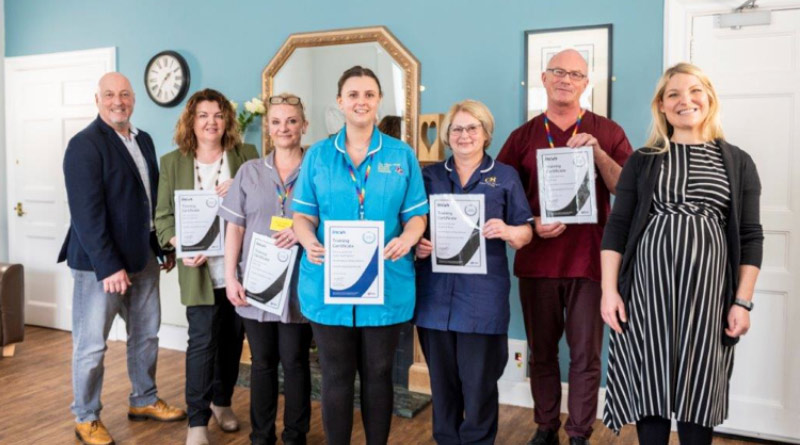Puddington Care Home Receives Gold Award for Sensory Loss Accessibility
A Cheshire care home has become the first in the UK to receive the incus Gold Award for its proactive approach to sensory loss.
Both Chapel House Nursing Home and Plessington Court Residential Home, in Puddington, Cheshire, achieved the award from training provider incus-care following a five-step process, over a two-year period.
At least 75% of people living in care will have a hearing impairment, 50% a visual impairment and over 70% will have some form of cognitive impairment. Financial and staffing pressures coupled with an emphasis on the provision of nursing care have led to the sensory loss needs of this growing sector being under-serviced and often overlooked.
The aim of the incus-care Awards is to ensure residents in care homes with sensory loss are communicated with, in the correct ways, their specific needs are met and they are supported to live fulfilling lives.
Brian Cadwallader, incus Training Manager said: “Firstly congratulations to Chapel House and Plessington Court on achieving their incus Gold award. From their initial registration, through the training phases and onto their audit process, it was very clear that both teams acknowledged DSN’s incus initiative and the benefits it has brought in terms of engaging in tailored training modules, improving knowledge, learning new skills and, importantly meeting the specific needs of their residents with sensory impairment.
“The evidence of their achievement was very clear to see, with defined objectives set, strong leadership and the willingness of staff to embrace the changes. Chapel House and Plessington Court staff excelled in all areas of the incus care programme, resulting in two very deserved Gold awards.”
Cathrina Moore, who is also an Admiral Nurse, said: “We’re really proud to be the first care home in the country to have been awarded Gold by incus.
“Cognitive problems can be exacerbated by sensory issues so it is important to ensure that we minimise the impact of this by reducing issues for each of our residents.
“As a result of the incus training, our staff have been trained to approach sensory loss issues with specialist techniques. We have installed doorbells which light up when someone is knocking on the door so a resident with hearing loss isn’t startled if someone walks into their room.
“Residents with hearing loss can also access our portable loop system and use specialist headphones to improve their listening experience when watching television. We also ensure that all our residents have regular hearing tests so we can identify those who need more support.
“We’re already seeing some good results. We have improved people’s listening experience and helped with their overall communication. We’ve noticed that people are joining in with more activities and interacting better with their relatives.
“Residents also love the new doorbells and they help to reduce anxiety because they can see – rather than hear – that someone wants to come into their room.”
Dr Jenna Littlejohn, who helped to pioneer the standard said: “Unmanaged sensory impairment exacerbates social isolation and loneliness, ultimately leading to poorer quality of life. It is associated with an increased risk of depression, stroke, hypertension, dementia, frailty, falls and early mortality. Through a bespoke package of works, incus-care helps to guide care staff to promote good sensory health for residents.
“Working individually with each setting we can create a course which addresses their needs, focusing on often overlooked areas such as: identification and management of common hearing and visual impairments; recognising the role of equipment and the environment and implementing new care and communication plans for residents with sensory loss. We are delighted to announce Chapel House and Plessington Court as our first Gold Award achievers.”





